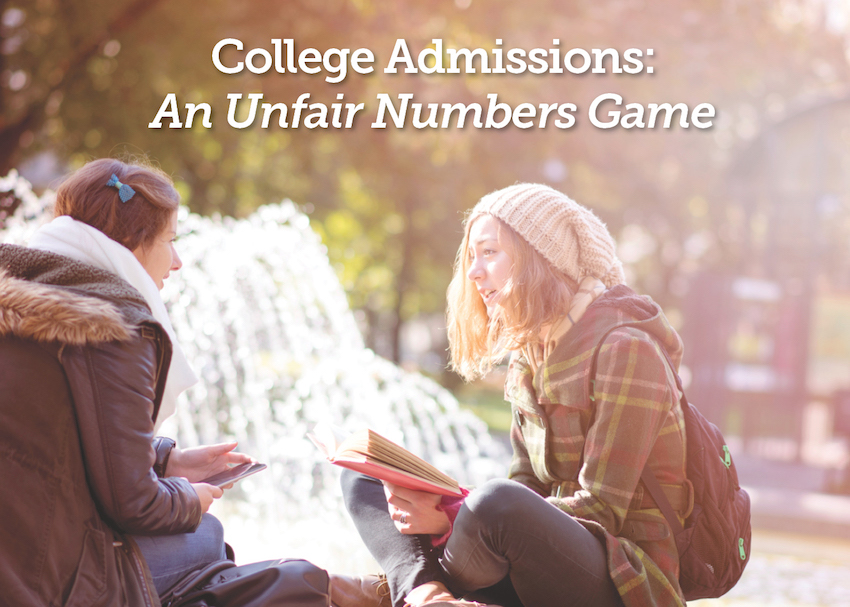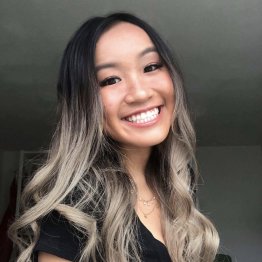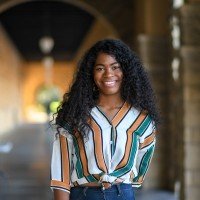
On the whole, college admissions is a difficult process to navigate, no matter whether you’re a parent, student, counselor, or teacher. It’s an incredibly stressful time for students and parents alike, filling out forms and making huge decisions. Counselors and teachers are facing similar stresses, as they’re trying to guide students in the right directions while supporting their decisions. As plenty of students have experienced (and will continue to experience), applying to college can be somewhat unfair at times. So what exactly makes it so? We surveyed college counselors and parents to find out:
Stephanie Kennedy, Founder of MyCollegePlanningTeam: “In a word, ‘rankings’ are unfair. Ranking of colleges and universities has become an increasingly popular way of perceiving the prestige of colleges; and consumers, i.e., parents and students are taking the bait. Sadly, most families do not realize that rankings rarely measure the quality of education or the chances of success for the graduate. Rankings are usually determined by a quotient of selectivity. That selectivity is largely “created” by attracting more applicants, but accepting fewer. More students are lured by personalized (but mass-mailed) letters encouraging them to apply, falsely raising the student’s hopes that they are actually being “courted” by that university! We, as counselors, expend great energy couching the bad news to excellent students that it is not worth their $75 to apply just so that university can increase its selectivity.”
Ellen T., Parent: “I am helping my 17 year old son with college applications. My son is a Caucasian from Utah. It seems that colleges want minorities from certain areas and if he is an average student with average extra curricular activities- he doesn’t matter. Why is it that even “average” colleges seem to be looking for these “extraordinary leaders.” How can a young man in high school be a proven leader at such a young age. I realize that no one wants to call themselves average - but some people are!”
Meggie Moris, Manager of Counseling at Summa Education: “There are often neglected portions of the application in addition to the essays, such as the activities and awards descriptions. Those are presented on the applications in ways that don’t command a lot of attention from students, but are often extremely helpful in getting admission readers to construct a frame or context for student personal statements (essays). A lot of students are not coached on how to fill out those portions, and thus miss out on important opportunities to construct more favorable images of themselves. Guidance counselors, academic coaches, and even admissions reps hardly ever tell students this.
In addition to the various ways that students can carefully describe their activities, awards, and community service throughout their applications to construct a frame for admissions officers to view them, students should also make sure that their personal statements expand upon those activities rather than reflexively answer the prompts provided by the schools. Many students do not understand that the essay prompts are meant to get students to speak about themselves in ways that provide insightful answers about why they were involved in the specific activities they’ve listed, and what those activities have done to shape or encourage certain aspects about their characters. Some of the prompts can seem very strange or can seem to prompt students to speak about things other than what they’ve done, so it can be very easy for students to accidentally miss important opportunities to highlight their unique qualities and achievements. For instance, one of the Common Application essay prompts states “The lessons we take from failure can be fundamental to later success*.* Recount an incident or time when you experienced failure. How did it affect you, and what did you learn from the experience?” Typically, students will focus solely on the moment of failure and why it had such an impact, often recounting things from their childhood. Unfortunately, although that kind of response would *seem* to answer the prompt, it really doesn’t help a student appear more attractive to an admissions officer. Rather, students are *supposed* to use this prompt to briefly mention a failure (preferably something more recent), and then spend the majority of the essay explaining how the episodes helped students recognize important values that they fostered in other experiences and areas of their lives, bringing out more important aspects of their resumes.
Although this may seem trivial compared to other areas of college admissions, it is unfair nonetheless. Without proper coaching in the application and essay writing process, it would be difficult for students to be able to effectively write the kinds of personal statements that admissions officers are looking for on their own.”
Jennifer Aquino, Independent Educational Consultant: “I’m an Independent Educational Consultant based in Auckland and Singapore. I am American yet all of my clients are international and 90% apply to the US. The nature of the US admissions process is arbitrary and as it’s subjective—at the end of the day humans decide—there is always the element of luck. Some may call it “unfair”. I think what’s “unfair” is the reliance on sub-standard rankings that give 10% of the story and allow people to make judgments based on half-baked information. Likewise, every college will have a different way of taking decisions, and those go on behind closed door. It’s an imperfect process. My biggest “issue” is that international students—if they don’t have the money or understanding to hire help to guide them through the process (what’s a standardized test, how to write an American-style essay—what in the world is self-introspection??, the value of connecting individually with admissions and how), they are at a total disadvantage.”
Alina A., Parent: “My son is a high-school Junior getting ready for the college application process. Here is our problem: He goes to the top public high school in NYC, Stuyvesant HS. Most Honors colleges offer merit scholarships for kids with averages above 95. However, they make no distinction between a 95 from a weak high school and one that was recently named #1 in the country. What this means is that my son would have been more likely to get aid if he’d gone to a less challenging school and gotten higher grades. How is that fair and/or encouraging kids to push themselves?”
Clark Steen, College Consultant: “I am the owner of a company specializing in college admissions and test prep. My wife and I also worked admissions. As specialists, we have found the least fair aspect of the applications process to be socioeconomic. There is a tendency to think that minorities or the poor have an unfair advantage in admissions in order to make certain that colleges make their numbers jibe to avoid legal entanglements. While this idea of numbers being met has validity, it is also true that the poor, often minorities, but certainly not always or even necessarily the majority of applicants, generally have not gone to selective private schools or adequately funded public schools. They similarly may need to work, rather than having time to build a really stellar resume. In short, whatever small advantage that the poor and minorities may have based strictly on numbers is rarely able to compensate for the massive disadvantages they face in terms of environment. This is the elephant in the room ensuring that inequity will continue for the foreseeable future. If you have any questions, I can be contacted as delineated below.”
If you’re looking for help with your college essays and applications, search our database to find a mentor like you. See essays, stats, and advice and find out how students got in, and how you can finally get into your dream school too. Sign up now and enter our scholarship for a chance to win $5,000 from AdmitSee!
















 Back
Back